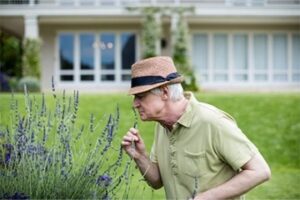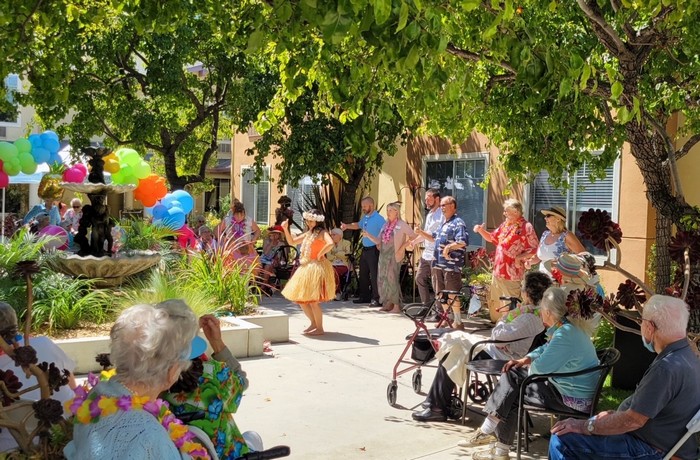Category Archives: Senior Living
Let’s meet Kathleen Good

by Patricia Schallert
There are many seniors among us who have lived and continue to live lives that can be considered “success stories” …. Let’s meet Kathleen Good from CAPS RADIO KPPQ 104.1 FM and see how she sees it.
Kathleen Good, an incredible retiree with a second or maybe third career, is a talk show host at CAPS Media, KPPQ 104.1 FM. (Community Access Partners of San Buenaventura) She attended UW-Madison, Wisconsin and earned a Masters Degree in Rehabilitation Psychology—Special Education.
She worked to set up a first generation of special education resource classrooms. Then reflected that after a life-changing event, she took an opportunity to go to New York that had always intrigued her. While working with learning disabled students in art, she created three-dimensional fiber pieces which were so unusual they found their way into New York galleries and shows and gave her a reason to make the move to New York.
Kathleen moved to London after meeting her husband where she did training for a qualification in psychotherapy/counseling and developed a private practice. Her niche specialty was working with artists who were experiencing creative blocks and unable to move forward with their chosen artistic form.
After a couple of false starts, Kathleen settled less on the idea of retirement and more on working in radio and television. When she discovered CAPS Media, a non-profit in Ventura, Kathleen initially produced funny videos on climate change. When CAPS added a radio service, KPPQ 104.1 FM, she found it to be a great fit for expanding her ideas on women’s equality. To create the show, she used all the experiences gained during years of teaching, counseling, and making art—as well as the technical skills she learned from the master-level CAPS staff.
With no experience in radio at all, she launched “In The Women’s Room” a radio talk show at CAPS Radio dedicated to “educating the public about women’s issues, women’s concerns, and women in the arts.” “In the Women’s Room” exists, Kathleen reflects, to “support and appreciate women.” She hosts guests who give women ideas, expertise, information, and resources about universal issues and concerns.” She is focusing this year on women working in climate mitigation and that includes women in action groups, government entities, and non-profit agencies.
Kathleen feels she lives a happy successful retirement and values the turning points in her life as they created the opportunities that moved her forward. She takes her time producing a show so she is able to do research, consider questions, write and edit, and works hard to get to know her guest so she can get out the very best message to the public
Kathleen responded to my question about lessons she has learned over the years with these thoughts: “I think there is a remedy to every problem or issue if you look long enough. Even problems that can’t be entirely fixed, can be lessened, alleviated or mitigated.” She also believes that movement (stretching and strengthening) is the key to being able to continue with her relevant work. Her day is centered around movement work-outs interspersed with computer time, Zooming and talking!
Editor: If you are a senior, or know of one, who would like to share their retirement, or job, with us let us know at [email protected].
A Good Night’s Sleep
by National Institute on Aging
Many older people don’t sleep well. If you’re always sleepy or you find it hard to get enough sleep at night, it may be time to see a doctor. Waking up every day feeling tired is a sign that you are not getting the rest you need.
Older adults need about the same amount of sleep as all adults—7 to 9 hours each night. But, older people tend to go to sleep earlier and get up earlier than they did when they were younger.
There are many reasons why older people may not get enough sleep at night. Feeling sick or being in pain can make it hard to sleep. Some medicines can keep you awake. No matter the reason, if you don’t get a good night’s sleep, the next day you may:
- Be irritable
- Have memory problems or be forgetful
- Feel depressed
- Have more falls or accidents
- Get a Good Night’s Sleep
- Getting a good night’s sleep infographic icon. Click through for full text.
- Read and share this infographic to get tips on how to get a good night’s sleep.
Being older doesn’t mean you have to be tired all the time. You can do many things to help you get a good night’s sleep. Here are some ideas:
- Follow a regular sleep schedule. Go to sleep and get up at the same time each day, even on weekends or when you are traveling.
- Avoid napping in the late afternoon or evening, if you can. Naps may keep you awake at night.
- Develop a bedtime routine.
- Take time to relax before bedtime each night. Some people read a book, listen to soothing music, or soak in a warm bath.
- Try not to watch television or use your computer, cell phone, or tablet in the bedroom. The light from these devices may make it difficult for you to fall asleep. And alarming or unsettling shows or movies, like horror movies, may keep you awake.
- Keep your bedroom at a comfortable temperature, not too hot or too cold, and as quiet as possible.
- Use low lighting in the evenings and as you prepare for bed.
- Exercise at regular times each day but not within 3 hours of your bedtime.
- Avoid eating large meals close to bedtime—they can keep you awake.
- Stay away from caffeine late in the day. Caffeine (found in coffee, tea, soda, and chocolate) can keep you awake.
Having trouble sleeping can mean you:
- Take a long time to fall asleep
- Wake up many times in the night
- Wake up early and are unable to get back to sleep
- Wake up tired
- Feel very sleepy during the day
Often, being unable to sleep becomes a habit. Some people worry about not sleeping even before they get into bed. This may make it harder to fall asleep and stay asleep.
Some older adults who have trouble sleeping may use over-the-counter sleep aids. Others may use prescription medicines to help them sleep. These medicines may help when used for a short time. But remember, medicines aren’t a cure for insomnia.
Developing healthy habits at bedtime may help you get a good night’s sleep.
T cells are an essential part of the immune system and help the body fight off infection

Exposure to social stress was associated with accelerated aging of the immune system, according to an NIA-funded study recently published in PNAS. The body’s immune system changes as people age, and there’s large variability in these changes. The study, led by researchers at UCLA, investigated whether social stressors added to immune system decline.
The researchers analyzed data from more than 5,500 people enrolled in the Health and Retirement Study, a long-term, nationally representative study of Americans over age 50. The researchers measured stress by analyzing responses to questions about exposure to various types of social stress, including discrimination, trauma, and other life events, such as unemployment. They also analyzed the participants’ immune profiles — a snapshot of immune system function — by drawing blood and measuring white blood cell levels, specifically T lymphocytes (also called T cells). T cells are an essential part of the immune system and help the body fight off infection.
Results showed that exposure to social stress was associated with a greater proportion of T cells committed only to fighting infections like those already encountered and fewer T cells that could adapt to new challenges, indicative of accelerated immune aging. The association between social stress and T cells was still present even after controlling for education, smoking, drinking, body mass index, and race or ethnicity.
Researchers did find that, after controlling for lifestyle factors such as diet and exercise habits, the connection between stress and accelerated immune aging was not as strong. These findings suggest that improving diet and exercise behaviors in older adults may help offset the immune aging associated with stress.
Increased immune aging is associated with chronic diseases, weakened response to acute infections, increased risk of pneumonia, reduced efficacy of vaccines, and organ system aging. This study provides important insights into the effect of social stress on immune aging, highlighting the key role of health behaviors and social-environmental conditions. It also identifies potential intervention points that may be useful in addressing inequalities in aging.
This research was supported in part by NIA grants U01AG009740 and P30AG017265.
Five ways to get the most out of your doctor’s visit
Have you ever left your doctor’s office realizing you forgot to ask an important question? Or were you frustrated because you didn’t fully understand the doctor’s instructions? These tips may help.
1. Decide what questions are most important to ask the doctor
Before your appointment, pick three or four questions or concerns that you most want to talk about with the doctor. You can tell him or her what they are at the beginning of the appointment, and then discuss each in turn. If you have time, you can then go on to other questions.
2. Stay focused on why you are there
Although your doctor might like to talk with you at length, each patient is given a limited amount of time. To make the best use of your time, stick to the point. For instance, give the doctor a brief description of the symptom, when it started, how often it happens, and if it is getting worse or better.
3. Be honest with your doctor
It is tempting to say what you think the doctor wants to hear, for example, that you smoke less or eat a more balanced diet than you really do. While this is natural, it’s not in your best interest. If you are lesbian, gay, bisexual, or transgender, it’s important to come out to your doctor, as people who are LGBT have unique health needs. Your doctor can suggest the best treatment only if you say what is really going on. For instance, you might say: “I have been trying to quit smoking, as you recommended, but I am not making much headway.”
4. Share your point of view about the visit with your doctor
Tell the doctor if you feel rushed, worried, or uncomfortable. If necessary, you can offer to return for a second visit to discuss your concerns. Try to voice your feelings in a positive way. For example, you could say something like: “I know you have many patients to see, but I’m really worried about this. I’d feel much better if we could talk about it a little more.”
5. Remember, the doctor may not be able to answer all your questions
Even the best doctor may be unable to answer some questions. Most doctors will tell you when they don’t have answers. They also may help you find the information you need or refer you to a specialist. If a doctor regularly brushes off your questions or symptoms as simply a part of aging, think about looking for another doctor.
Senior classes offered
OLLI at CSU Channel Islands Fall I Zoom classes began on August 22 but you can still register. Choose from 10 courses, some on Zoom and some both on Zoom and in person, including:
- Civic Education on Trump and American History
- Cosmology, Astronomy, and Space Exploration
- Soiled Doves and Working Girls – California
- Profiles of Important Enlightenment Thinkers
Aimed at adults 50 and over, OLLI offers intellectually stimulating six-week college-level courses on a variety of topics without the burden of homework, tests or grades. Classes are $60 each, with a great price on unlimited classes.
For more information, contact the OLLI team at
https://ext.csuci.edu/programs/professional-community-ed/osher-lifelong-learning-institute/ or much easier at (805) 437-2748, Option”2″
Statins may reduce the risk of Parkinson’s-like symptoms in older adults

Older adults who take a cholesterol-lowering drug known as a statin may have a lower risk of developing Parkinson’s-like movement symptoms, according to an NIA-funded observational study published in Neurology. Fatty plaques in brain blood vessels have been linked to parkinsonism, an umbrella term for conditions that cause movement symptoms associated with Parkinson’s disease. The researchers found that taking a statin was associated with improved brain blood vessel health and decreased parkinsonian signs in older adults.
Parkinson’s is a serious nervous system disorder that affects less than 5% of the population; however, approximately 30% of adults over age 65 have parkinsonism. People with parkinsonism experience movement symptoms seen in Parkinson’s, including characteristic changes in gait, slowness of movement, tremor, and muscle stiffness. These undesirable symptoms can also increase the risk of falls, disability, and dementia.
People with evidence of cardiovascular disease in their brains are more likely to develop parkinsonism. In these cases, fatty plaques build up on the walls of brain blood vessels, making them stiff. Statins — drugs used to lower cholesterol and other fats — can help eliminate the plaques and keep brain blood vessels healthy. The study researchers at the NIA-supported Alzheimer’s Disease Research Center at Rush University Medical Center in Chicago sought to explore whether statins could be a sound therapeutic strategy to treat or prevent parkinsonism.
The research team followed 2,841 older adults enrolled in studies at the Rush Alzheimer’s Disease Center for an average of six years. They noted whether each participant took a statin and continually tested for signs of parkinsonism. The team also later measured fatty plaques in the brain blood vessels of the 1,044 deceased participants. Results showed that older adults who took a statin had better brain blood vessel health and a lower risk of developing parkinsonism. The researchers also performed statistical analyses that suggest the ability of statins to reduce brain blood vessel stiffness is at least partly responsible for the decrease in parkinsonism risk.
Currently, there are limited options for treating movement problems that occur later in life, and these findings demonstrate the potential of using statins to treat parkinsonism. Still, the authors note several limitations to their study. Because the study was observational, randomized controlled trials are needed to determine if statins can prevent or treat parkinsonism. In addition, the participants in the study were primarily White, highly educated older adults. Future studies should examine the association between statin use and parkinsonism in a set of participants that more accurately reflects the diversity of the population.
Aging BiologyAlzheimer’s Disease Research CentersChronic ConditionsGerontologyTranslational Research
This research was supported in part by NIA grants .
Loss of smell linked to Alzheimer’s cognitive impairment and biomarkers.

Decline in sense of smell is connected to faster buildup of Alzheimer’s disease-related pathology seen in brain scans, according to new research focused on older adults who live outside of nursing homes. The findings provide additional evidence that loss of smell (known as anosmia) is a key early sign of Alzheimer’s-related cognitive impairment and the accumulation of associated harmful proteins, such as amyloid-beta and tau. The research, led by NIA scientists, was published in the Journal of Alzheimer’s Disease.
Decline in sense of smell had previously been confirmed as an early warning sign for Alzheimer’s in both human and animal studies, but its connection to the uptick of dementia-related brain imaging biomarkers over time had not been as closely studied in larger populations of older adults. For this study, the team tracked 364 participants from the Baltimore Longitudinal Study of Aging (BLSA) over an average period of about 2.5 years. The NIA-led BLSA is the longest running study of healthy aging in America.
The participants were initially cognitively normal and given baseline cognitive and odor identification tests and PET scans, a type of brain imaging that can detect amyloid-beta and tau deposits associated with Alzheimer’s and related dementias. Over the study period, 17 participants, or 5% of the total tracked, were diagnosed with mild cognitive impairment (MCI), of which 11 cases were associated with Alzheimer’s, three with vascular dementia, and one with frontotemporal dementia. Two were unspecified based on clinical characteristics.
The research team found that each point of lower odor identification test performance was associated with a 22% higher chance of developing MCI. This relation remained similar even after the investigators adjusted for age, sex, race, education, olfactory test version, apolipoprotein E gene (APOE ε4) carrier status, smoking, elevated depressive symptoms, and vascular disease. The PET brain scans of this subset of participants showed that lower olfactory scores were associated with higher levels of Alzheimer’s pathology in the brain, particularly in regions associated with the sense of smell, including parts of the orbital frontal cortex, and regions important to memory and learning, such as the temporal lobe. Further, participants with greater olfactory decline over time had higher levels of amyloid and tau in some regions related to both smell and memory function.
These results indicate that loss of olfactory function is closely tied to both the level and progression of neuropathological damage seen in Alzheimer’s. The study provides new evidence that may explain why poorer sense of smell is an early warning sign for Alzheimer’s-related MCI. The researchers hope to follow up on this work to look deeper into whether olfaction can predict other types of dementia-related neurodegenerative changes.
This research was supported by the Intramural Research Program grant Z01-AG000015-57 and NIA grant P30AG066507.
These activities relate to NIA’s AD+ADRD Research Implementation Milestone 9.M, “Develop diagnostics/biomarkers in asymptomatic individuals.”
Seminar on Brain Health & Wellness: Caregiver Resources
by Carol Leish, MA
On August 18, 2022, Ventura County’s Area Agency on Aging hosted one of their monthly seminars through Zoom reflecting upon Brain Health & Wellness. Today’s seminar, Caregiver Resources, focused on what is offered within Ventura County to assist caregivers.
Moderator, Maureen Hodge, LCSW, High Risk Program Manager for Care Connections (Community Memorial Health System), said that, “Caregivers are the backbone of our community.”
Blair Barker, Care Services Director at the Camarillo Health Care District said that, “Over 20% of the population here in Ventura County are caregivers. Most are women. And, many are caregivers for older adults. 36% of caregivers within the county say that being a caregiver is at least slightly stressful for them.”
“Senior Concerns in Thousand Oaks offers many services for caregivers,” according to Martha Shapiro, Director of Programs. “Our caregiver support groups help caregivers to get rid of their feeling of being alone. With others they realize that tears are permitted and humor is encouraged.
“Besides offering support groups,” Shapiro said, “we also offer legal and financial aid for free. We have an Adult Day Care Center on site. We mainly serve the east county: Thousand Oaks, Simi Valley, and Westlake. We are here to help people throughout Ventura County.” For further information from Senior Concerns, contact Martha Shapiro at: (805) 497-0189 or, [email protected].
“The Camarillo Health Care District serves Camarillo, unincorporated Camarillo, and Somis, along with other cities within Ventura County that request help,” according to, Barker. “We also offer support groups for caregivers. We have a resource library to help out people. The legal and financial aid that we offer helps caregivers with assistance of doing a Durable Power of Attorney; Advanced Health Care Directive, and Estate Planning. We also offer screening of caregivers for depression & caregivers well-being.” For further information from the Camarillo Health Care District, contact Blair Barker at: (805) 388-1952 or, [email protected].
“The Ventura County Area Agency on Aging (VC AAA) offers, TCARE (Tailored Caregiver Assistance & Referral),” according to, Haleh Hashemzadeh, Clinical Program Operations Manager. “We also offer a variety of support for caregivers who are helping people who are older or who are disabled. Assessing the caregivers’ needs enables us to better assist them” For more information from the VC AAA, contact Haleh Hashemzadeh at: (805) 477-7300 or, [email protected].
Dementia Friendly Ventura County will be presenting: ‘Living Well, Caring Well’ on September 7th, 2022 from 10am-12pm at the Camarillo Healthcare District which is located at 3639 E. Las Posas Rd. in Camarillo. The event, which will be a one-stop shop for people living with dementia-related disease and their caregivers will be in back of building F. Important local resources will be displayed, along with the opportunity to speak to industry professionals in person. You’ll be able to learn about services provided at various places: Adult Day Centers; Adult Protective Services; Alzheimer’s Association; Financial Resources; Health Insurance Counseling & Advocacy; Legal/Advanced Planning; Long Term Care Ombudsman; and, Public Benefit Programs (Medi-CAL & Cal Fresh).
For more information about the upcoming Living Well, Caring Well event, call: (800) 272-3900 or look at the Dementia Friendly Ventura County website at: vcaaa.org/dfvc.
Life In Paradise at Cypress Place Senior Living
A festive Tiki Party complete with Hawaiian music and dancers.
Cypress Place Senior Living in Ventura served up a taste of paradise on Wednesday August 17, 2022 when the senior community hosted a festive Tiki Party complete with Hawaiian music and dancers, Tiki bar, and appetizers. Residents, families, and friends of the community were in attendance at this free event that was open to the public.
“I love the events that we have here at Cypress Place,” gushed resident Pat Eichenhofer. “This one had music and performers, and they even had dance lessons for anyone who wanted to try it.” When asked if she took part in the dance lesson, Eichenhofer said no, but that she enjoyed watching those who did.
Festivities took place from 2:00 p.m. to 3:00 p.m. in the courtyard turned tropical paradise at Cypress Place. Attendees came decked out in festive tropical shirts and dresses and were provided with complimentary leis.
One of those who did take part in the dance lesson was Cypress Place executive director Gina Salman. “That was so much fun,” she exuded. “I love seeing our residents and members of the community enjoy themselves at these events. Everyone is having a ball.”
Glancing over to the dance floor, she smiled as several gentlemen participated in the dance lesson, shaking their hips along with the performers in grass skirts. The crowd loved it. Paradise indeed.
Cypress Place Senior Living is located at 1200/1220 Cypress Point Lane in Ventura. For more information or to RSVP, please call 805-650-8000.
To learn more about Cypress Place Senior Living of Ventura, visit www.cypressplaceseniorliving.com.

